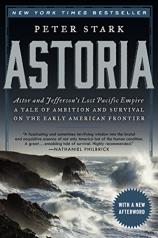Astoria: Astor and Jefferson's Lost Pacific Empire: A Story of Wealth, Ambition, and Survival
Review
Astoria: Astor and Jefferson's Lost Pacific Empire: A Story of Wealth, Ambition, and Survival
California, here we come! Well, sort of. ASTORIA by Outdoor magazine columnist Peter Stark explores the dangerous events that transformed the U.S. into a Pacific trading power.
When the story begins, it is two years after Lewis and Clark completed their trek to the outermost part of the Western coast at the edge of the Pacific. Two men who packed considerable influence on all things cultural and political --- industrialist John Jacob Astor and former President Thomas Jefferson --- decided to create a colony like Jamestown on that rich and fertile coast. The Astor Expedition, in all its daring and commitment, was one of the most dangerous ever attempted in the name of exploration --- a three-year journey hoping to establish a definitive and powerful American presence on the Pacific Coast. However, these seemingly ready and prepared band of explorers had to survive the forces of Mother Nature, and subsequent starvation and madness, to create the Oregon Trail, permanently reconfiguring the map of U.S. territories.
"With its blood and guts and macho imperialist craziness running rampant through the pages, ASTORIA is a can’t-put-the-book-down adventure that can stand proudly with other historical tomes about man’s attempts to tame nature, claim it as his own, and then corrupt the hell out of it."
Although taking place only from 1810 to 1813, ASTORIA is a truly great adventure story, filled with high drama and hardship that would put “Survivor” cast members into a tailspin of humility. With more than 140 members of the two advance parties that reached the West Coast --- one crossing the Rockies, the other rounding Cape Horn --- dying through violent encounters with man and beast, it was a terribly deadly ordeal. Yet the expedition did establish successfully a trading post in the Columbia River, called Fort Astoria.
Stark is a writer who loves details. His delightful description of scurvy won’t soon leave your head: “Typically setting in after about ten to twelve weeks without fresh food, its early symptoms included fatigue, weakness, and malaise, followed by a swelling of the gums, loosening of the teeth, and opening of old scars as the body’s tough, connective collagen tissues started to unravel. Then the blood vessels and organs began to leak and hemorrhage, followed shortly by death.” Clear enough for you?
No matter how crazy the scheme, Stark treats everyone --- from Astor with all his money and Jefferson with all his grandiose ideas about what the United States should become, to the Clayoquot warriors with their penchant for violence and yen for blood --- with a gravity and a respect befitting the scope of this historical period and its important effects on the modern world. No one plays too small a part in this expansive drama, and no one is spared Stark’s deeply investigative gaze.
With all the recent furor over the depths to which various countries are plumbing to investigate the ocean floor in search of the downed Malaysian Airlines jet, it is hard to imagine that a group of guys trekking through the woods to establish a small colony of like-minded capitalists offered a serious engagement with natural forces from which humans would not come out victorious. But this clearly establishes, like so much of the early history of exploration in the U.S., that Mother Nature has always offered serious opposition to our way of life. Taming that ruthless force has been the most exciting part of our American adventure, and Astor puts this particular period into crystal-clear context.
With its blood and guts and macho imperialist craziness running rampant through the pages, ASTORIA is a can’t-put-the-book-down adventure that can stand proudly with other historical tomes about man’s attempts to tame nature, claim it as his own, and then corrupt the hell out of it. That a wealthy industrialist and a beloved American president and Founding Father saw this journey as necessary for progress provides compelling evidence of the adventure’s grandeur and impact.
Reviewed by Jana Siciliano on April 24, 2014
Astoria: Astor and Jefferson's Lost Pacific Empire: A Story of Wealth, Ambition, and Survival
- Publication Date: February 10, 2015
- Genres: History, Nonfiction
- Paperback: 400 pages
- Publisher: Ecco
- ISBN-10: 0062218301
- ISBN-13: 9780062218308




